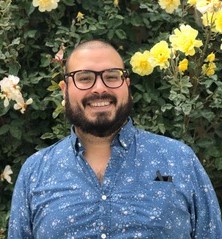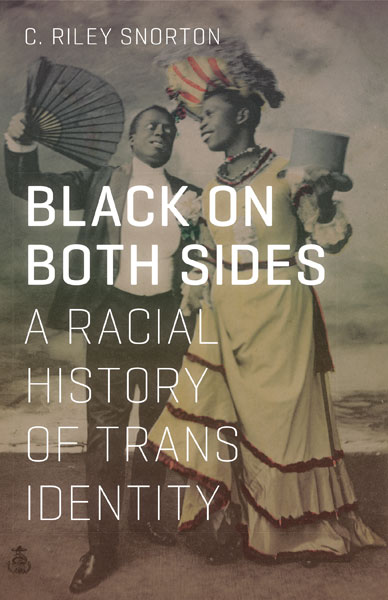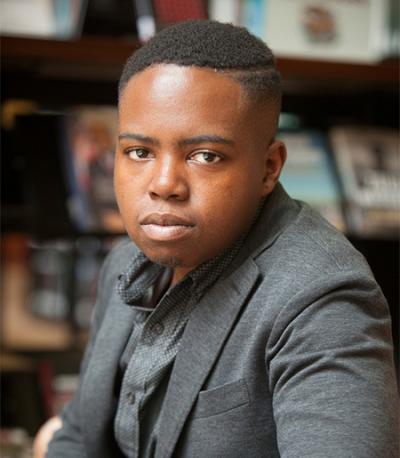Online Roundtable: ‘Black on Both Sides’: A Racial History of Trans Identity
December 3-7, 2018
Black Perspectives,the award-winning blog of the African American Intellectual History Society (AAIHS), is hosting an online roundtable on C. Riley Snorton’s Black on Both Sides: A Racial History of Trans Identity (University of Minnesota Press, 2017). It begins on Monday, December 3rd and concludes on Friday, December 7th. The roundtable will feature responses from Julio Capo Jr. (UMass Amherst), Alejandro Escalante (UNC-Chapel Hill), Ahmad Greene-Hayes (Princeton), L. H. Stallings (Georgetown), Jennifer C. Nash (Northwestern), and Rachel Zellars (University of Vermont). At the conclusion of the roundtable, author C. Riley Snorton (University of Chicago) will respond.
During the week of the online roundtable, Black Perspectives will publish new blog posts every day at 5:30AM EST. Please follow Black Perspectives (@BlkPerspectives) and AAIHS (@AAIHS) on Twitter; like AAIHS on Facebook; or subscribe to our blog for updates. By subscribing to Black Perspectives, each new post will automatically be delivered to your inbox during the week of the roundtable.
About the Author
C. Riley Snorton is Professor of English Language and Literature and in residence at the Center for Gender and Sexuality Studies at the University of Chicago. Snorton is a cultural theorist who analyzes representations of race and gender throughout history. He is the author of Nobody Is Supposed to Know: Black Sexuality on the Down Low (University of Minnesota Press, 2014) and Black on Both Sides: A Racial History of Trans Identity (University of Minnesota Press, 2017), winner of the Lambda Literary Award for Transgender Nonfiction and an American Library Association Stonewall Honor Book in Nonfiction. The book has also been recognized by the Organization of American Historians and the Institute for Humanities Research.
Snorton’s next monograph, tentatively titled Mud: Ecologies of Racial Meaning examines the constitutive presence of swamps to racial practices and formations in the Americas. Currently, he is coediting Saturation: Racial Matter, Institutional Limits and the Excesses of Representation (New Museum / MIT, forthcoming) and The Flesh of the Matter: A Hortense Spillers Reader (forthcoming). He has also coedited several special issues of journals, including “Blackness” for Transgender Studies Quarterly (2017), “The Queerness of Hip Hop / the Hip Hop of Queerness” for Palimpsest: A Journal on Women, Gender, and the Black International (2013), and “Media Reform” for the International Journal of Communication.
Snorton has been a recipient of a National Endowment for the Humanities fellowship at the New York Public Library’s Schomburg Center for Research in Black Culture, an Andrew W. Mellon postdoctoral fellowship at Pomona College, and two fellowships at Harvard’s W.E.B. Du Bois Institute for African and African American Research. He received his PhD from the University of Pennsylvania Annenberg School for Communication with graduate certificates in Africana studies and women, gender, and sexuality studies. Follow him on Twitter @CRileySnorton.
About the Participants
 Julio Capo Jr. is Associate Professor of History at the University of Massachusetts at Amherst. He is a transnational historian whose research and teaching interests include modern U.S. history, especially the United States’s relationship to the Caribbean and Latin America. He addresses how gender and sexuality have historically intersected and coalesced with constructions of ethnicity, race, class, nation, age, and ability. His first book, Welcome to Fairyland: Queer Miami before 1940 (UNC Press, 2017), is a transnational queer history of a city just “south of the U.S. South.” It highlights how transnational forces—including (im)migration, trade, and tourism—to and from the Caribbean shaped Miami’s queer past. The book has received six awards and honors, including the Charles S. Sydnor Award from the Southern Historical Association for the best book written on Southern history. Capó is currently working on two major projects. The first is tentatively titled Pulse: The Orlando Massacre and Queer Latinx Communities in History (under contract with UMass Press). It explores the long history of systemic violence, erasure, and displacement many queer people of color know well that set into motion the June 12, 2016 nightclub massacre in Orlando, Florida. He is also revising his dissertation, which won the Urban History Association’s Best Dissertation Prize in 2012, for future publication. Tentatively titled A Queer Refuge: Miami after World War II, it shifts attention to Miami’s queer, ethnic, and racial communities and the social and political movements they participated in once lesbian, gay, bisexual, and transgender identities had more formally crystallized in the city. His work has appeared in the Journal of American History, Radical History Review, Diplomatic History, Journal of Urban History, Journal of American Ethnic History, H-Net, and American Studies, as well as The Washington Post, Time, The Miami Herald, and El Nuevo Dia (Puerto Rico), with forthcoming works in Modern American History and several edited volumes. Follow him on twitter @JulioCapoJr.
Julio Capo Jr. is Associate Professor of History at the University of Massachusetts at Amherst. He is a transnational historian whose research and teaching interests include modern U.S. history, especially the United States’s relationship to the Caribbean and Latin America. He addresses how gender and sexuality have historically intersected and coalesced with constructions of ethnicity, race, class, nation, age, and ability. His first book, Welcome to Fairyland: Queer Miami before 1940 (UNC Press, 2017), is a transnational queer history of a city just “south of the U.S. South.” It highlights how transnational forces—including (im)migration, trade, and tourism—to and from the Caribbean shaped Miami’s queer past. The book has received six awards and honors, including the Charles S. Sydnor Award from the Southern Historical Association for the best book written on Southern history. Capó is currently working on two major projects. The first is tentatively titled Pulse: The Orlando Massacre and Queer Latinx Communities in History (under contract with UMass Press). It explores the long history of systemic violence, erasure, and displacement many queer people of color know well that set into motion the June 12, 2016 nightclub massacre in Orlando, Florida. He is also revising his dissertation, which won the Urban History Association’s Best Dissertation Prize in 2012, for future publication. Tentatively titled A Queer Refuge: Miami after World War II, it shifts attention to Miami’s queer, ethnic, and racial communities and the social and political movements they participated in once lesbian, gay, bisexual, and transgender identities had more formally crystallized in the city. His work has appeared in the Journal of American History, Radical History Review, Diplomatic History, Journal of Urban History, Journal of American Ethnic History, H-Net, and American Studies, as well as The Washington Post, Time, The Miami Herald, and El Nuevo Dia (Puerto Rico), with forthcoming works in Modern American History and several edited volumes. Follow him on twitter @JulioCapoJr.
 Alejandro Escalante is a Ph.D. student researching gender and race in Caribbean religion at the University of North Carolina at Chapel Hill, where he is concurrently pursuing graduate certificates in Women’s and Gender Studies and Latin American Studies. He holds a master’s degree from Union Theological Seminary and a bachelor’s degree from Trinity College. His dissertation project centers on la fiesta de Santiago Apóstol in Loíza, Puerto Rico (a predominantly Afro-Puerto Rican town), where each July hundreds gather to celebrate the feast of St. James by parading his statues through the streets, accompanied by traditional food, music, and dance. Alejandro is interested in the costuming and masking that occurs during the festivities, especially in a traditional group of characters called “locas,” men who darken their already Black skin with makeup, dress in women’s clothing, go around the neighborhoods of Loíza sweeping the porches and steps of people’s homes, and finally ask to be paid for the unsolicited work. Bringing together critical race theory, gender and sexuality studies, and performance studies, his work seeks to map feminist, queer, and Afro-Caribbean ideas of personhood vis-à-vis the history of African slavery, Spanish colonialism, and U.S. occupation in Puerto Rico and its religious life. Follow him on Twitter @aescalante0.
Alejandro Escalante is a Ph.D. student researching gender and race in Caribbean religion at the University of North Carolina at Chapel Hill, where he is concurrently pursuing graduate certificates in Women’s and Gender Studies and Latin American Studies. He holds a master’s degree from Union Theological Seminary and a bachelor’s degree from Trinity College. His dissertation project centers on la fiesta de Santiago Apóstol in Loíza, Puerto Rico (a predominantly Afro-Puerto Rican town), where each July hundreds gather to celebrate the feast of St. James by parading his statues through the streets, accompanied by traditional food, music, and dance. Alejandro is interested in the costuming and masking that occurs during the festivities, especially in a traditional group of characters called “locas,” men who darken their already Black skin with makeup, dress in women’s clothing, go around the neighborhoods of Loíza sweeping the porches and steps of people’s homes, and finally ask to be paid for the unsolicited work. Bringing together critical race theory, gender and sexuality studies, and performance studies, his work seeks to map feminist, queer, and Afro-Caribbean ideas of personhood vis-à-vis the history of African slavery, Spanish colonialism, and U.S. occupation in Puerto Rico and its religious life. Follow him on Twitter @aescalante0.
 Ahmad Greene-Hayes is a doctoral student in the Department of Religion at Princeton University, and an interdisciplinary scholar pursuing graduate certificates in African American Studies and Gender and Sexuality Studies. His research interests include Black religion(s), African American Pentecostalism, Holiness Movements, Gender and Sexuality in Black churches, and 19th-20th century African American and Africana religious histories. He is the past recipient of fellowships and apprenticeships from the Mellon Mays Foundation, the Schomburg Center for Research in Black Culture, and the Creating Connections Consortium (C3) at Columbia University. During 2017-2018, he held the LGBTS Research Fellowship at Yale University, and he currently holds the Religion and Public Life Fellowship from the Center for the Study of Religion at Princeton and is a Ford Foundation Predoctoral Fellow. In addition, he is an essayist and his public commentary on issues of race, gender, sexuality, Black politics and religion have appeared in The Black Scholar, Ebony, The Root, The Feminist Wire, the Huffington Post, Open Democracy and News One, among many other outlets. He is also the creator of #BlackChurchSex on Twitter, a progressive digital conversation on gender and sexuality in the contemporary life of the Black church, and he helped plan the #BlackChurchSex convening—“Love Thyself: Black Bodies and Religious Space”—co-sponsored by Princeton Theological Seminary’s Office of Black Church Studies and Columbia University’s Center on African American Religion, Sexual Politics and Social Justice. Follow him on Twitter @_BrothaG.
Ahmad Greene-Hayes is a doctoral student in the Department of Religion at Princeton University, and an interdisciplinary scholar pursuing graduate certificates in African American Studies and Gender and Sexuality Studies. His research interests include Black religion(s), African American Pentecostalism, Holiness Movements, Gender and Sexuality in Black churches, and 19th-20th century African American and Africana religious histories. He is the past recipient of fellowships and apprenticeships from the Mellon Mays Foundation, the Schomburg Center for Research in Black Culture, and the Creating Connections Consortium (C3) at Columbia University. During 2017-2018, he held the LGBTS Research Fellowship at Yale University, and he currently holds the Religion and Public Life Fellowship from the Center for the Study of Religion at Princeton and is a Ford Foundation Predoctoral Fellow. In addition, he is an essayist and his public commentary on issues of race, gender, sexuality, Black politics and religion have appeared in The Black Scholar, Ebony, The Root, The Feminist Wire, the Huffington Post, Open Democracy and News One, among many other outlets. He is also the creator of #BlackChurchSex on Twitter, a progressive digital conversation on gender and sexuality in the contemporary life of the Black church, and he helped plan the #BlackChurchSex convening—“Love Thyself: Black Bodies and Religious Space”—co-sponsored by Princeton Theological Seminary’s Office of Black Church Studies and Columbia University’s Center on African American Religion, Sexual Politics and Social Justice. Follow him on Twitter @_BrothaG.
 L.H. Stallings is Professor of African American Studies at Georgetown University. Her first book, Mutha’ is Half a Word!: Intersections of Folklore, Vernacular, Myth, and Queerness in Black Female Culture (Ohio State Univ. Press, 2007), critically engages folklore and vernacular theory, Black cultural studies, and queer theory to examine the representation of sexual desire in fiction, poetry, stand-up comedy, neo-soul, and hip-hop created by Black women. She is also co-editor and contributing author to Word Hustle: Critical Essays and Reflections on the Works of Donald Goines (2011), which offers a critical analysis of street literature and its most prolific author. Her second book, Funk the Erotic: Transaesthetics and Black Sexual Cultures (Univ. of Illinois Press, 2015), explores how Black sexual cultures produce radical ideologies about labor, community, art, and sexuality. It has received the Alan Bray Memorial Award from the MLA GL/Q Caucus, the 2016 Emily Toth Award for Best Single Work by One or More Authors in Women’s Studies from the Popular Culture Studies Association/ American Culture Association (PCA/ACA), and it was a 2016 Finalist for the 28th Annual Lambda Literary Awards for LGBTQ Studies. She has also published essays in African American Review, South-Atlantic Quarterly, GLQ, Signs: Journal of Women in Culture and Society, the Journal of Bisexuality, Black Renaissance/Renaissance Noire, Black Camera, Obsidian III, Revista Canaria de Estudios Ingleses, CR: The New Centennial Review, Western Journal of Black Studies, Feminist Formations, MELUS, and numerous edited collections.
L.H. Stallings is Professor of African American Studies at Georgetown University. Her first book, Mutha’ is Half a Word!: Intersections of Folklore, Vernacular, Myth, and Queerness in Black Female Culture (Ohio State Univ. Press, 2007), critically engages folklore and vernacular theory, Black cultural studies, and queer theory to examine the representation of sexual desire in fiction, poetry, stand-up comedy, neo-soul, and hip-hop created by Black women. She is also co-editor and contributing author to Word Hustle: Critical Essays and Reflections on the Works of Donald Goines (2011), which offers a critical analysis of street literature and its most prolific author. Her second book, Funk the Erotic: Transaesthetics and Black Sexual Cultures (Univ. of Illinois Press, 2015), explores how Black sexual cultures produce radical ideologies about labor, community, art, and sexuality. It has received the Alan Bray Memorial Award from the MLA GL/Q Caucus, the 2016 Emily Toth Award for Best Single Work by One or More Authors in Women’s Studies from the Popular Culture Studies Association/ American Culture Association (PCA/ACA), and it was a 2016 Finalist for the 28th Annual Lambda Literary Awards for LGBTQ Studies. She has also published essays in African American Review, South-Atlantic Quarterly, GLQ, Signs: Journal of Women in Culture and Society, the Journal of Bisexuality, Black Renaissance/Renaissance Noire, Black Camera, Obsidian III, Revista Canaria de Estudios Ingleses, CR: The New Centennial Review, Western Journal of Black Studies, Feminist Formations, MELUS, and numerous edited collections.
 Jennifer C. Nash is Associate Professor of African American Studies and Gender & Sexuality Studies at Northwestern University. She earned her Ph.D. in African and African American Studies from Harvard University. Her research centers on Black feminist theories; Black sexual politics; race, gender, and law; race, gender, and visual culture; and women’s/gender/sexuality studies’ institutional histories and politics. She is the author of The Black Body in Ecstasy: Reading Race, Reading Pornography (Duke University Press, 2014), which was awarded the Alan Bray Memorial Book Prize by the GL/Q Caucus of the Modern Language Association, and Black Feminism Reimagined: After Intersectionality (Duke University Press, 2019). She is the editor of Gender: Love (MacMillan, 2016), and co-edited a special issue of Feminist Formations titled “Institutional Feelings: Practicing Women’s Studies in the Corporate University.” She is the author of articles that have appeared in Signs, GLQ, Feminist Theory, Feminist Review, Feminist Studies, differences, and American Quarterly. Follow her on twitter @pornoscholar.
Jennifer C. Nash is Associate Professor of African American Studies and Gender & Sexuality Studies at Northwestern University. She earned her Ph.D. in African and African American Studies from Harvard University. Her research centers on Black feminist theories; Black sexual politics; race, gender, and law; race, gender, and visual culture; and women’s/gender/sexuality studies’ institutional histories and politics. She is the author of The Black Body in Ecstasy: Reading Race, Reading Pornography (Duke University Press, 2014), which was awarded the Alan Bray Memorial Book Prize by the GL/Q Caucus of the Modern Language Association, and Black Feminism Reimagined: After Intersectionality (Duke University Press, 2019). She is the editor of Gender: Love (MacMillan, 2016), and co-edited a special issue of Feminist Formations titled “Institutional Feelings: Practicing Women’s Studies in the Corporate University.” She is the author of articles that have appeared in Signs, GLQ, Feminist Theory, Feminist Review, Feminist Studies, differences, and American Quarterly. Follow her on twitter @pornoscholar.
 Rachel Zellars is a lawyer and postdoctoral fellow in history at the University of Vermont who studies slavery in Canada, its connection to the Atlantic world, and Black migration to and through Canada after the American Revolution. Her writing centers the “afterlives” of Canada’s history of slavery in the context of schooling segregation, gender violence, and disability/neurodiversity. In addition, she is a co-founder of Third Eye Collective, a survivor initiated collective for Black women dedicated to healing from and organizing against sexual, gender-based, intimate partner, state and institutional violence, as well as incest. Originally a farm girl from upstate New York, home has been Montreal, Quebec for the last 15 years. Follow her on twitter @rachelzellars.
Rachel Zellars is a lawyer and postdoctoral fellow in history at the University of Vermont who studies slavery in Canada, its connection to the Atlantic world, and Black migration to and through Canada after the American Revolution. Her writing centers the “afterlives” of Canada’s history of slavery in the context of schooling segregation, gender violence, and disability/neurodiversity. In addition, she is a co-founder of Third Eye Collective, a survivor initiated collective for Black women dedicated to healing from and organizing against sexual, gender-based, intimate partner, state and institutional violence, as well as incest. Originally a farm girl from upstate New York, home has been Montreal, Quebec for the last 15 years. Follow her on twitter @rachelzellars.


